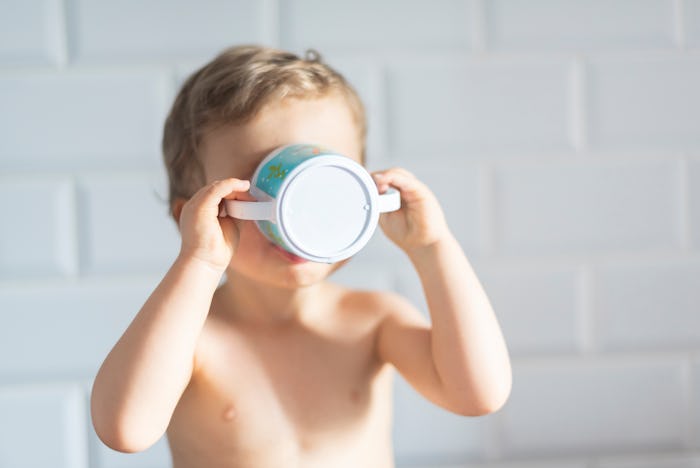Toddler Milestones

5 Signs Your Toddler Is Ready To Drink From An Open Cup, According To Experts
It happens earlier than you may think.
Baby bottles take up a lot of very valuable cabinet space, so it's not surprising so many parents are eager to transition their kiddo to something else. It's an exciting thought, but before you pack things up, make sure you're definitely seeing signs that your toddler is ready to drink from an open cup. The last thing you want to do is pack (or throw) away all of those bottles too early and have to dig them back out in defeat.
Truth be told, you may find yourself freeing up cabinet space sooner than you think, because your tot will likely start signaling they're ready for a cup before their first birthday. Here's what to look for.
Your Toddler Can Drink From A Graduated Bottle
"Toddlers may be ready to drink from a regular cup if they can drink from a level 3 or 4 bottle nipple without difficulty," pediatrician Whitney Casares, M.D., M.P.H., F.A.A.P., tells Romper via email. Based off Dr. Brown's nipple progression chart, this typically happens when the baby is between 6 and 9 months old.
Remember this is a process, and every baby develops at their own pace. If your tot isn't showing signs its ready at 9 months, don't stress. However, you "definitely want to try to wean from a bottle to a cup by 12-15 months" to ensure proper oral and palate development, says Bonzani.
They Can Sit Independently On The Floor
It seems like as soon as a baby can sit on their own, they're suddenly able to do all kinds of other things. While independent sitting isn't a certain sign of readiness for drinking from an open cup, it is a prerequisite. "The child should be able to sit independently on the floor and sit well in a high chair" before they start drinking from an open cup, pediatric occupational therapist, Lilie L. Bonzani, OTR/L, tells Romper in an email.
They Can Hold A Cup Without Help
"Children who can hold a cup without assistance from an adult are often able to drink out of an open cup easily," Dr. Casares says. However, that doesn't mean they'll innately know how to do it (without waterboarding themselves, at least), you'll need to be patient and teach them how to use it. "Parents can help their toddlers learn to drink from an open cup by demonstrating the action themselves," explains Dr. Casares. When you're working on this skill, try using an open sippy cup that has handles because they "allow parents to train their little ones to tip a cup upward and learn the physical motions required to handle liquids from an open cup."
They Have Good Head Control
"Strong head control is another physical sign of readiness to use an open cup," Dr. Casares notes. So, if your toddler is sitting solo and has good head control, get ready to teach. "As with all motor skills, [your child will need] plenty of practice," Bonzani says. "To encourage using a cup independently, offer water from a cup in the bathtub where you don’t mind getting messy," Bonzani suggests. Or, she suggests, put just a small amount in the cup and hand it to your baby/toddler to bring to their mouth independently.
They Reach For Others' Cups
Toddlers are notoriously bad at keeping their hands to themselves, but in this case it's a good sign they're ready for an open cup. "Usually around 9 months or so, babies start reaching for their parent's cups," says Bonzani, "This is a good time to offer formula, breast milk, or water via an open cup." Just remember to start off slow. "Usually we start with a small cup –a small juice glass, a toy cup, or even a shot glass," Bonzani says. "Initially all the liquid may dribble out of the mouth but with practice, the baby will start coordinating her mouth to close her lips around the cup and swallow the liquid."
One final piece of advice? "Don't worry about the mess," says Bonzani, because there are definitely going to be spills in the process. So, grab a stack of towels and a change of clothes, and with every puddle of water you clean up, think about all of that open cabinet space you'll have when this is all over.
Experts:
Lilie L. Bonzani, OTR/L, Pediatric Occupational Therapist at Duke University Health
Dr. Whitney Casares, M.D., M.P.H., F.A.A.P., author of The New Baby Blueprint: Caring for You and Your Little One